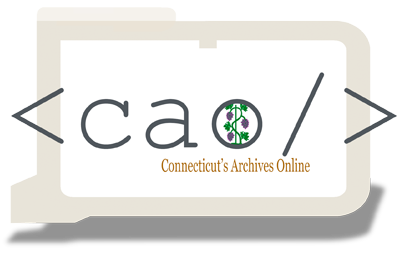What is CAO
Connecticut’s Archives Online (CAO) was undertaken by the Western Connecticut State University Archives in 2008 and is a project that leverages the power and portability of EAD to search archival holdings in our state. We are continually looking for additional Connecticut repositories to participate in this endeavor which is free to users and participants. Click here if your repository would like to participate.
Connecticut is home to a rich variety of resources that document the story of the State’s people, events and organizations. Additionally, there is much documentation in Connecticut of people, events and organizations outside the State. This documentation (letters, recordings, maps, diaries, photographs, videos, drawings, etc.), also known as archival materials, are preserved within the State’s many cultural, historical and educational institutions. Documents in these institutions are parts of collections that range in size from one item to many hundreds of boxes of items. CAO brings together descriptions of these collections – called “finding aids” – to connect you with what archival material is available in CT and where to find it.
Want to find out if an archive in Connecticut has information on a topic you are researching? Search CAO. Do you like and appreciate CAO? Let your legislator know!
FAQs
What is a finding aid?
A finding aid is a summary of what is in an archival collection. It will tell you about the collection’s creation, context, size, topics and materials. With this information, you can determine if a collection is relevant to your research. A finding aid also tells you where you can find the collection, how to contact the organization that preserves it and the parameters of accessing and using it.
How do I search these Connecticut finding aids?
You type a term in the box and click . You may search all the finding aids at once or limit your search to certain repositories, subjects, names, places, or dates. Browsing the list of participating repositories allows you to navigate to a single organization where you can search only their finding aids. When you are viewing a finding aid, use the search box to search within that finding aid.
Does CAO include digital versions of collection items (photographs, documents, etc.)?
Yes, or at least when a finding aid links to digital content, CAO shows those links. CAO only searches archival finding aids, so if it’s in the finding aid, we search it.
How can I learn more about an item I’m interested in?
Contact the repository that holds those items. Keep in mind that when contacting the CAO, it is not a repository and does not have any collections – CAO just provides a search.
How do I know what repository has a particular item I’m searching for?
When viewing a finding aid or search hit, you will see access information for that particular item. The access information will at least give you a website, email and address and some provide a phone number to contact the repository that preserves a particular item.
How much does it cost to use?
Nothing. It’s free.
How much does it cost to participate?
Nothing. It’s free.
Who is CAO for?
It is for archivists and the public. Archivists can use it to search their own materials or help patrons with materials in their geographic area. The public can use CAO to get an easy snapshot of what CT’s primary source holdings are in relation to a given topic.
You can even easily add a CAO search box to your site.
How does CAO work?
If a repository has finding aid data in EAD, we can search it.
If the repository doesn’t have finding aids or their data in EAD, we can provide access to tools to help to turn that around. Contact us if you’d like help creating EAD. We can even help you to create a repository level finding aid for your material.
CAO utilizes the great work undertaken by the ArcLight project which is itself based on BlackLight – a Ruby on Rails application. ArcLight and our customization and configurations are all open source.
CAO continues to run on WCSU servers and is administered by WCSU archivists Brian Stevens and Stacy Haponik. Any questions? Feel free to contact us!
Our GitHub site is at: https://github.com/archivalGrysbok/wcsu-arclight
 Connecticut's Archives Online
Connecticut's Archives Online